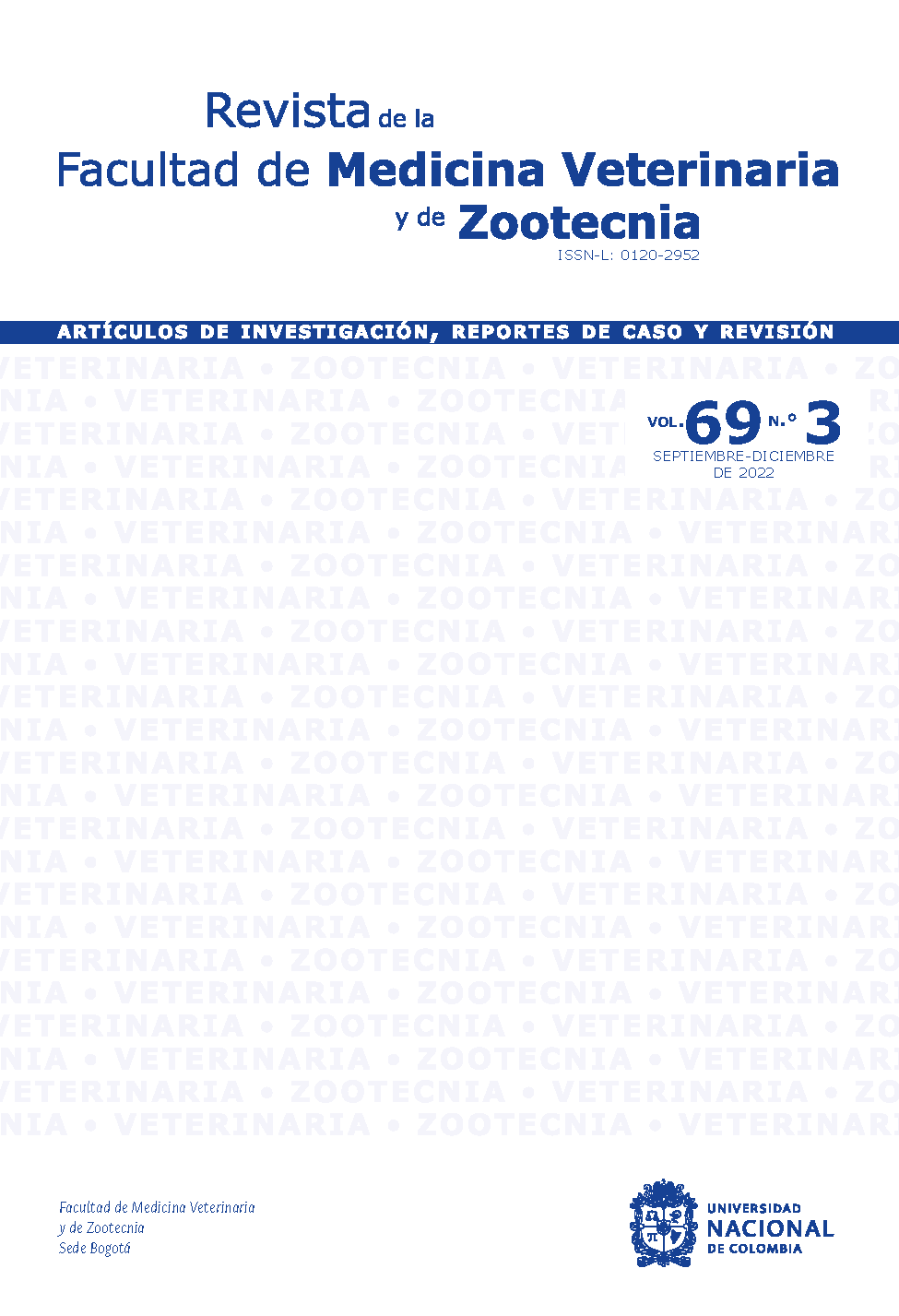Apropiación de los elementos de innovación social en organizaciones comunitarias agropecuarias del departamento de Boyacá, Colombia
Appropriation of the elements of social innovation in community agricultural organizations of the department of Boyaca, Colombia
DOI:
https://doi.org/10.15446/rfmvz.v69n3.99196Keywords:
sostenibilidad empresarial, análisis cualitativo, territorio, redes, producción (es)corporate sustainability, qualitative analysis, territory, networks, production (en)
Downloads
Con el objetivo de establecer criterios mínimos relativos a la innovación social en organizaciones comunitarias agropecuarias, se hizo uso de herramientas propias de la investigación cualitativa que incluyeron búsquedas especializadas y uso de programas para análisis de datos bibliográficos (por ejemplo VOSviewer™) para determinar los elementos relativos a la gestión, gobernanza, capacidades, modelo de negocio sostenibilidad para ocho (8) organizaciones comunitarias de productores agropecuarios de la provincia del Sugamuxi, en el departamento de Boyacá, Colombia.
Se pudo establecer que algunas organizaciones de productores agropecuarios que ejercen actividades en el departamento de Boyacá no están apropiando de forma integral los elementos de innovación social (en niveles operativos y gerenciales) y, consecuentemente, existe toda una ruta de mejoramiento por desarrollar con estas para optimizar los índices de eficiencia organizacional; además, se evidencia la complejidad de la temática, dado que la sostenibilidad de las innovaciones sociales dependerá en gran medida de la gestión de las organizaciones, donde se establezcan agendas institucionales compartidas contextualizadas y ajustadas a los territorios. Es necesario optimizar los canales de participación de manera mancomunada entre el Estado, las organizaciones y los mismos productores para poder dinamizar procesos, metas y alcances reales de la innovación social a la luz de los acelerados cambios a los que se enfrenta el productor agropecuario agremiado en Colombia, relativos estos a la dinámica del mercado, el acceso a recursos y otros.
In order to establish minimum criteria related to social innovation in agricultural community organizations, qualitative research tools were used, including specialized searches and the use of programs for the analysis of bibliographic data (for example VOSviewer™), with the purpose of defining the elements related to management, governance, capacities, business model and sustainability for eight (8) community organizations of agricultural producers in the province of Sugamuxi, in the department of Boyacá, Colombia. It was possible to establish that some organizations of agricultural producers that carry out activities in the department of Boyacá are not integrally appropriating the elements of social innovation (at operational and managerial levels) and, consequently, there is a whole route of improvement to be developed with them to optimize the organizational efficiency indexes; in addition, the complexity of the subject is evident, given that the sustainability of social innovations will depend largely on the management of the organizations, where shared institutional agendas contextualized and adjusted to the territories are established. It is necessary to optimize the channels of participation in a joint manner between the State, the organizations, and the producers themselves to be able to dynamize processes, goals and the real scope of social innovation in light of the accelerated changes faced by the agribusiness producer in Colombia, related to market dynamics, access to resources and others.
References
Batle J, Orfila-Sintes F, Moon CJ. 2018. Environmental management best practices: Towards social innovation. Int J Hosp Manag. 69:14-20. https://doi.org/10.1016/j.ijhm.2017.10.013
Biggs R, Westley FR, Carpenter SR. 2010. Navigating the back loop: Fostering social innovation and transformation in ecosystem management. Ecol Soc. 15(2):25. http://www.ecologyandsociety.org/vol15/iss2/art9/
Cajaiba-Santana G. 2014. Social innovation: Moving the field forward. A conceptual fra¬mework. Technological Forecasting and Social Change. 82:42-51. https://doi.org/10.1016/j.techfore.2013.05.008
Castro-Arce K, Parra C, Vanclay F. 2019. Social innovation, sustainability and the governance of protected areas: Revealing theory as it plays out in practice in costa rica. Journal of Environmental Planning and Management. 62(13):2255-2272. https://doi.org/10.1080/09640568.2018.1537976
Cordoba–Pachon JR, Mapelli F, Al Taji FNA, Donovan DM. 2020. Systemic creativities in sustainability and social innovation education. Syst Pract Action Res.17:251-267. https://doi. org/10.1007/s11213-020-09530-z
De Wit A, Mensink W, Einarsson T, Bekkers R. 2019. Beyond service production: Volunteering for social innovation. Nonprofit and Voluntary Sector Quarterly. 48:52S-71S. https://doi.org/10.1177/0899764017734651
Duque D, Quitaquez Villamarin G, Montenegro I, Rojas Villamil AM, Cárdenas Rey A. 2016. Bases conceptuales de una política de innovación social. http://repositorio.colciencias.gov.co/handle/11146/285
Edwards-Schachter M, Wallace ML. 2017. ‘Shaken, but not stirred’: Sixty years of defining social innovation. Technological Forecasting and Social Change. 119:64-79. https://doi.org/10.1016/j.techfore.2017.03.012
González KJ. 2009. Propuesta estratégica y metodológica para la gestión en el trabajo colaborativo. Revista Educación. 33(2):95-107. https://www.redalyc.org/pdf/440/44012058007.pdf
Govigli VM, Alkhaled S, Arnesen T, Barlagne C, Bjerck M, Burlando C, Melnykovych M, Fernandez-Blanco CR, Sfeir P, Gorriz-Mifsud E. 2020. Testing a framework to co-construct social innovation actions: Insights from seven marginalized rural areas. Sustainability. 12(4):26. https://doi.org/10.3390/su12041441
Icbf. 2020. [accessed]. https://www.icbf.gov.co/programas-y-estrategias/estrategia-compras-locales/ asociaciones-productoras-boyaca.
Jimenez-Ibanez E, Jorda-Albinana B, del Rio Cogorno JG, Magal-Royo T. 2019. Social innovation and empowerment in colombian companies through design management. Dyna. 94(5). https://doi.org/10.6036/9321
Kar AK, Ilavarasan V, Gupta MP, Janssen M, Kothari R. 2019. Moving beyond smart cities: Digital nations for social innovation & sustainability. Information Systems Frontiers. 21(3):495-501. https://doi.org/10.1007/s10796-019-09930-0
Machado Valadão Júnior V. 2013. Social enterprises in brazil: Socially produced knowledge versus social innovation. Journal of technology mana-gement & innovation. 8(suppl 1):15-15. https://doi.org/10.4067/S0718-27242013000300015
Moore ML, Westley F. 2011. Surmountable chasms: Networks and social innovation for resilient systems. Ecol Soc. 16(1):13. http://www.ecologyandsociety.org/vol16/iss1/art5/
Ochoa Rodriguez Y. 2015. Preliminary pha¬se in the process of social innovation with agricultural and milk producers of viracacha - boyaca. Inquietud Empresarial. 15(1):53- 74. https://www.academia.edu/27962688/Revista_Inquietud_Empresarial_XV_1_
Otzen T, Manterola C. 2017. Técnicas de muestreo sobre una población a estudio. International journal of morphology. 35(1):227-232. http://dx.doi.org/10.4067/S0717-95022017000100037
Piccarozzi M. 2017. Does social innovation contribute to sustainability? The case of italian innovative start-ups. Sustainability. 9(12):28. https://doi.org/10.3390/su9122376
Prandini R. 2018. Themed section: The person-centred turn in welfare policies: Bad wine in new bottles or a true social innovation? Introduction. Int Rev Sociol. 28(1):1-19. https://doi.org/10.1080/03906701.2017.1422888
Rojas De Francisco L, Macías Prada JF. 2019. Autogestión, emprendimiento social e innovación social: Un análisis de contenidos publicados en twitter. Tec Empresarial. 13(3):42-57. http://dx.doi.org/10.18845/te.v13i3.4208
Rover OJ, de Gennaro BC, Roselli L. 2017. Social innovation and sustainable rural development: The case of a brazilian agroecology network. Sustainability. 9(1). https://doi.org/10.3390/su9010003
Santamaria Ramos J, Madariaga Orozco CA. 2019. Determinantes de la innovación social en las fundaciones de cuarta generación de barranquilla, colombia. Innovar. 29(73):113-132. https://doi.org/10.15446/innovar.v29n73.78026.
Tranfield D, Denyer D, Smart P. 2003a. Towards a methodology for developing evidence-informed management knowledge by means of systematic review. British Journal of Management. 14(3):207- 222. https://doi.org/10.1111/1467-8551.00375
Tranfield D, Denyer D, Smart P. 2003b. Towards a methodology for developing evidence‐informed management knowledge by means of systematic review. British journal of management. 14(3):207- 222. https://doi.org/10.1111/1467-8551.00375
Van der Have RP, Rubalcaba L. 2016. Social innovation research: An emerging area of innovation studies? Research Policy. 45(9):1923-1935. http://dx.doi.org/10.1016/j.respol.2016.06.010
How to Cite
APA
ACM
ACS
ABNT
Chicago
Harvard
IEEE
MLA
Turabian
Vancouver
Download Citation
License
Copyright (c) 2022 Revista de la Facultad de Medicina Veterinaria y de Zootecnia

This work is licensed under a Creative Commons Attribution-NonCommercial-NoDerivatives 4.0 International License.
© Facultad de Medicina Veterinaria y de Zootecnia, Universidad Nacional de Colombia.
Copying and citation of materials that appear in the Journal are authorized as long as a clear statement indicates the journal title, author(s) name(s), year of publication, volume, and the number of pages of the article cited.
















